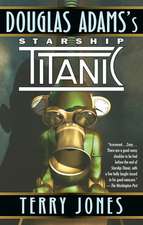Weapons of Choice: Axis of Time Trilogy
Autor John Birminghamen Limba Engleză Paperback – 31 mar 2005
a catastrophic event disrupts the course of World War II, forever changing the rules of combat. . . .
The impossible has spawned the unthinkable. A military experiment in the year 2021 has thrust an American-led multinational armada back to 1942, right into the middle of the U.S. naval task force speeding toward Midway Atoll—and what was to be the most spectacular U.S. triumph of the entire war.
Thousands died in the chaos, but the ripples had only begun. For these veterans of Pearl Harbor—led by Admirals Nimitz, Halsey, and Spruance—have never seen a helicopter, or a satellite link, or a nuclear weapon. And they’ve never encountered an African American colonel or a British naval commander who was a woman and half-Pakistani. While they embrace the armada’s awesome firepower, they may find the twenty-first century sailors themselves far from acceptable.
Initial jubilation at news the Allies would win the war is quickly doused by the chilling realization that the time travelers themselves—by their very presence—have rendered history null and void. Celebration turns to dread when the possibility arises that other elements of the twenty-first century task force may have also made the trip—and might now be aiding Yamamoto and the Japanese.
What happens next is anybody’s guess—and everybody’s nightmare. . . .
From the Trade Paperback edition.
| Toate formatele și edițiile | Preț | Express |
|---|---|---|
| Paperback (3) | 61.88 lei 22-36 zile | |
| BALLANTINE BOOKS – 31 mar 2005 | 61.88 lei 22-36 zile | |
| Penguin Books – 6 dec 2006 | 120.89 lei 43-57 zile | |
| Del Rey Books – 31 mai 2004 | 121.60 lei 43-57 zile |
Preț: 61.88 lei
Nou
Puncte Express: 93
Preț estimativ în valută:
11.84€ • 12.39$ • 9.86£
11.84€ • 12.39$ • 9.86£
Carte disponibilă
Livrare economică 10-24 martie
Preluare comenzi: 021 569.72.76
Specificații
ISBN-13: 9780345457134
ISBN-10: 0345457137
Pagini: 512
Dimensiuni: 106 x 175 x 28 mm
Greutate: 0.25 kg
Editura: BALLANTINE BOOKS
Seria Axis of Time Trilogy
ISBN-10: 0345457137
Pagini: 512
Dimensiuni: 106 x 175 x 28 mm
Greutate: 0.25 kg
Editura: BALLANTINE BOOKS
Seria Axis of Time Trilogy
Extras
Chapter 1
East Timor, Zone Time: 0942 Hours, 15 January 2021
The Calihate spy, a Javanese carpenter known simply as Adil, resettled himself against a comfortable groove in the sandalwood tree. The small, shaded clearing in the hills overlooking Dili had been his home for three days. He shared it with an aged feral cat, which remained hidden throughout the day, and an irritable monkey, which occasionally tried to shit on his head. He had considered shooting the filthy animal, but his orders were explicit. He was to remain unnoticed as long as the crusaders were anchored off East Timor, observing their fleet and sending reports via microburst laser link, but only in the event of a "significant development."
He had seen nothing "significant" in seventy-two hours. The infidel ships were lying so far offshore they were often lost in haze and distance. Only when night fell did he have any real chance of seeing them, and even then they remained little more than a blurred constellation of twinkling, faraway lights. Such was their arrogance they didn't bother to cloak themselves in darkness.
Jets roared to and from the flight deck of their carrier twenty-four hours a day. In deepest night the fire of the launches appeared to Adil as though God Himself had lit a torch on the rim of the world.
Occasionally a helicopter would appear from the direction of the flotilla, beginning as a small, indistinct dot in the hot gray sky, taking on recognizable form only as the muffled drone of its engines clarified into a thudding, growling roar. From his hiding spot Adil could almost make out the faces of the infidels in the cabins of the fat metal birds. American, British, French, they all looked alike, cruel and overfed, a thought that reminded him of his own hunger.
He unwrapped the banana leaves from around a small rice cake, thanking Allah for the generosity of his masters. They had included a little dried fish in his rations for today, a rare treat.
Sometimes, when the sun climbed directly overhead and beat down with a slow fury, Adil's thoughts wandered. He cursed his weakness and begged God for the strength to carry out his duty, but it was hard. He had fallen asleep more than once. Nothing ever seemed to happen. There was plenty of movement down in Dili, which was infested with crusader forces from all over the Christian world, but Dili wasn't his concern. His sole responsibility was to watch those ships that were hiding in the shimmering haze on the far horizon.
Still, Adil mused, it would be nice to know he had some real purpose here; that he had not been staked out like a goat on the side of a hill. Perhaps he was to be part of some elaborate strike on the Christians in town. Perhaps tonight the darkness would be torn asunder by holy fire as some martyr blew up one of their filthy taverns. But then, why leave him here on the side of this stupid hill, covered in monkey shit and tormented by ants?
This wasn't how he had imagined jihad would be when he had graduated from the Madrasa in Bandung.
USS Kandahar, 1014 Hours, 15 January 2021
The marines wouldn't have been surprised at all to discover that someone like Adil was watching over them. In fact, they assumed there were more than two hundred million pairs of eyes turned their way as they prepared to deploy into the Indonesian Archipelago.
Nobody called it the Caliphate. Officially the United States still recognized it as the sovereign territory of Indonesia, seventeen thousand islands stretching from Banda Aceh, three hundred kilometers off the coast of Thailand, down to Timor, just north of Australia. The sea-lanes passing through those islands carried a third of the world's maritime trade, and officially they remained open to all traffic. The Indonesian government-in-exile said so-from the safety of the Grand Hyatt in Geneva where they had fled, three weeks earlier, after losing control of Jakarta.
Unofficially though, these were the badlands, controlled-just barely-by a revolutionary Islamic government calling itself the Caliphate and laying claim to all seventeen thousand islands, as well as the territory of Malaysia, the Philippines, Brunei, East Timor, Papua New Guinea, Bougainville, and, for good measure, northern Australia. Nonbelievers were not welcome. The spiritual leader of the Caliphate, Mullah Ibn Abbas, had proclaimed this as the will of Allah.
The Eighty-second Marine Expeditionary Unit begged to differ. And on the hangar deck of the USS Kandahar, a Baghdad-class littoral assault ship, they were preparing a full and frank rebuttal.
The hangar was a vast, echoing space. Two full decks high and running nearly a third of the length of the slab-sided vessel, it still seemed crowded, packed tight with most of the Eighty-second's air wing-a small air force in its own right consisting of a dozen Ospreys, four aging Super Stallions, two reconditioned command Hueys, eight Sea Comanche gunships, and half a dozen Super Harriers.
The Harriers and Super Stallions had been moved onto the "roof"-the flight deck, thus allowing the ground combat element of the Eighty-second MEU to colonize the space that had been opened up. The GCE was formally known as the Third Battalion of the Ninth Regiment, Fifth Marine Division. It was also known as the Lonesome Dead, after their passably famous CO, Colonel J. Lonesome Jones.
Not all of 3 Batt were embarked upon the Kandahar. The battalion topped out at more than twelve hundred men and women, and some of their number had to be berthed elsewhere in the three ships that were carry-
ing the Eighty-second into harm's way. The USS Providence, a Harper's Ferry-class amphibious landing dockship (LSD), took the battalion's four Abrams tanks, a rifle company, and the amphibious assault vehicle platoon. The Kennebunkport, a venerable LPD 12, carried the recon platoon, the regiment's Humvees, two more Hueys, the drone platoon, and the Navy SEAL team that would be providing security to the Eighty-second during their cruise through the archipelago.
Even as Adil unwrapped his rice cake and squinted into the blue expanse of the Wetar Strait a six-man detachment from the SEAL team was unpacking their gear on the hangar deck of the Kandahar, where they were getting set to train the men of C Company, 3 Batt.
Charlie Company doubled as Colonel Jones's cliff assault and small boat raiding squadron, and the SEALs had come to acquaint them with a new toy: the G4, a lightweight assault rifle that fired strips of caseless ceramic ammunition and programmable 30mm grenades. It was to become standard equipment throughout the U.S. armed forces within twelve months. The marines, however, were always at the bottom of the food chain, and would probably have waited two years before they laid hands on these toys. But the battalion logistics officer, Lieutenant Colonel Nancy Viviani, was an inventive and talented S4. As always, Viviani was determined that the battalion should have the very best equipment other people's money could buy.
Not that long ago she would have been known as a scavenger, a scrounger, and would have done her job under the cover of darkness with a pair of wire cutters and a fast getaway jeep. She would have been a man, too, of course. But Lieutenant Colonel Viviani carried two master's degrees into combat, one of them an MBA from the London School of Economics, and the graduates of that august institution didn't stoop to anything so crude as petty theft. Not when they could play the Pentagon's fantastically complex supply programs like an antique violin.
Six and a half hours of extracurricular keyboard time had been enough to release a shipment of G4s from pre-positioned supply vessels in Darwin. Viviani's genius was in making the process appear entirely legitimate. Had the Senate Armed Forces Committee itself spent a year inspecting her electronic audit trail, it would have found everything in order with absolutely nothing linking the G4 shipment to the loss of a similar supply package scheduled for delivery to an army public relations unit.
"This is the Remington G-four," CPO Vincente Rogas barked at the members of C Company. "By the end of today's lecture you will be familiar with the procedure for maintaining this weapon in the field." It sounded more like a threat than a promise.
"The G-four is the first solid-state infantry weapon," he bellowed. "It has very few moving parts."
A slight murmur passed through the tight knot of marines. They were familiar with the weapons specs, having intensively trained with them back in the United States. But still, it was a hell of a thing to wrap your head around.
"And this is the standard battle load." His audience stared at the long thin strip of ceramic munitions like children at their first magic show. "The ammo strip is placed in the barrel like this. An electrical charge ignites the propellant casing, driving the slug out with such velocity that, even with a three-round burst, you will feel no kickback-at least not before the volley leaves the muzzle.
"Tomorrow, when we move ashore to the range, each of you will be allotted three hundred rounds. I suggest very strongly that before then you take advantage of the full VR tutorial we've loaded into your training sets. The base software package is a standard Asian urban conflict scenario, but we've added modules specifically tailored for operations in Jakarta and Surabaya."
With deployment less than a fortnight away, similar scenes were being replayed throughout the U.S.-led Multinational Force accompanying the Kandahar. Twelve thousand very serious men and women drilled to the point of exhaustion. They were authorized by the UN Security Council to use whatever force was necessary to reestablish control of the capital, Jakarta, and to put an end to the mass murder of Indonesia's Chinese and Christian minorities. Everybody was preparing for a slaughter.
In the hundred-bed hospital of the Kandahar the Eighty-second's chief combat surgeon, Captain Margie Francois, supervised her team's reaction to a simulated missile strike on an armored hovercraft carrying a marine rifle company into a contested estuary.
Two thousand meters away, the French missile frigate Dessaix dueled with a pair of Raptors off the supercarrier USS Hillary Clinton.
In the other direction, three thousand meters to the west, two British trimaran stealth destroyers practiced their response to a successful strike by suicide bombers whose weapon of choice had been a high-speed rubber boat. Indeed, Captain Karen Halabi, who had been on the receiving end of just such an attack as a young ensign, drilled the crew of the HMS Trident so fiercely that in those few hours they were allowed to sleep, most dreamed of crazy men in speedboats laden with TNT.
JRV Nagoya, 1046 Hours, 15 January 2021
As diverse as these ships were, one still stood out. The Joint Research Vessel Nagoya was a purpose-built leviathan, constructed around the frame of an eighty-thousand-tonne liquid natural gas carrier. Her keel had been laid down in Korea, with the fit-out split between San Francisco and Tokyo, reflecting the multinational nature of her funding. She fit in with the sleek warships of the Multinational Force the way a hippo would with a school of swordfish.
Her presence was a function of the speed with which the crisis in Jakarta had developed. The USS Leyte Gulf, a stealth cruiser from the Clinton's battle group, had been riding shotgun over the Nagoya's sea trials in the benign waters off Western Australia. When the orders came down that the carrier and her battle group were to move immediately into the Wetar Strait the Nagoya had been left with no choice but to tag along until an escort could be assigned to shepherd her safely back to Hawaii. It was a situation nobody liked, least of all Professor Manning Pope, the leader of the Nagoya team.
Crouched over a console in his private quarters, Pope muttered under his breath as he hammered out yet another enraged e-mail directly to Admiral Tony Kevin, commander in chief, U.S. Pacific Command. It was the ninth such e-mail he had sent in forty-eight hours. Each had elicited a standardized reply, not from the admiral himself mind you, but from some trained monkey on his personal staff.
Pope typed, stabbing at the keys:
Need I remind you of the support this Project elicits at THE VERY HIGHEST LEVELS OF GOVERNMENT. I would not wish to be in your shoes, Admiral Kevin, when I explain to your superiors that we have gone over budget while being dragged into this pointless fiasco. The NAGOYA is a research vessel, not a warship, and we should have been allowed to continue our trials unmolested in the perfectly safe testing range off Perth. As small as they are, the Australian navy are more than capable of fending off any drunken fishermen who might have strayed too close.
Therefore I DEMAND that we be freed from this two-penny opera and allowed to return to our test schedule as originally planned. I await your earliest reply. And that means YOURS, Admiral Kevin. Not some junior baboon!
That'll put a rocket under his fat ass, thought Pope. Bureaucrats hate it when you threaten to go over their heads. It means they might actually have to stagger to their feet and do something for a change.
Spleen vented for the moment, he keyed into the vidlink that connected him with the Project control room. A Japanese man with a shock of unruly, thick black hair answered the hail.
"How do we look for a power-up this morning, Yoshi?" Pope asked. "I'm anxious to get back on schedule."
Standing at a long, curving bank of flatscreens Professor Yoshi Murayama, an unusually tall cosmic string theorist from Honshu, blew out his cheeks and shrugged. "I can't see why not from this end. We're just about finished entering the new data sets. We're good to go, except you know that Kolhammer won't like it."
"Kolhammer's a chickenshit," Pope said somewhat mournfully. "I really don't care what he thinks. He's not qualified to tell us what we can and cannot do. You are."
"Like I said," the Japanese Nobel winner responded. "I don't see a problem. Just a beautiful set of numbers."
"Of course." Pope nodded. "Everyone else feel the same?" he asked, raising his voice so that it projected into the room beyond Murayama. The space was surprisingly small for such a momentous undertaking, no bigger than a suburban living room really. Large glowing monitors shared the area with half a dozen senior Project researchers, each staffing a workstation.
His question caught them off-guard. Their boss enjoyed a hard-won reputation as a thoroughly unpleasant little prick with an amazingly rigid pole up his ass. A couple of them exchanged quick glances, but nobody said anything for a few moments until Barnes, their magnetic ram technician, ventured a reply.
"Well, it's not our fault we fell behind. But you can bet we'll get blamed if we don't hustle to catch up."
"Exactly!" Pope replied. "Let's prepare for a test run at point-zero-one efficiency. That should be enough to confirm a stabilized effect with the new figures. Are we all agreed?"
From the Trade Paperback edition.
East Timor, Zone Time: 0942 Hours, 15 January 2021
The Calihate spy, a Javanese carpenter known simply as Adil, resettled himself against a comfortable groove in the sandalwood tree. The small, shaded clearing in the hills overlooking Dili had been his home for three days. He shared it with an aged feral cat, which remained hidden throughout the day, and an irritable monkey, which occasionally tried to shit on his head. He had considered shooting the filthy animal, but his orders were explicit. He was to remain unnoticed as long as the crusaders were anchored off East Timor, observing their fleet and sending reports via microburst laser link, but only in the event of a "significant development."
He had seen nothing "significant" in seventy-two hours. The infidel ships were lying so far offshore they were often lost in haze and distance. Only when night fell did he have any real chance of seeing them, and even then they remained little more than a blurred constellation of twinkling, faraway lights. Such was their arrogance they didn't bother to cloak themselves in darkness.
Jets roared to and from the flight deck of their carrier twenty-four hours a day. In deepest night the fire of the launches appeared to Adil as though God Himself had lit a torch on the rim of the world.
Occasionally a helicopter would appear from the direction of the flotilla, beginning as a small, indistinct dot in the hot gray sky, taking on recognizable form only as the muffled drone of its engines clarified into a thudding, growling roar. From his hiding spot Adil could almost make out the faces of the infidels in the cabins of the fat metal birds. American, British, French, they all looked alike, cruel and overfed, a thought that reminded him of his own hunger.
He unwrapped the banana leaves from around a small rice cake, thanking Allah for the generosity of his masters. They had included a little dried fish in his rations for today, a rare treat.
Sometimes, when the sun climbed directly overhead and beat down with a slow fury, Adil's thoughts wandered. He cursed his weakness and begged God for the strength to carry out his duty, but it was hard. He had fallen asleep more than once. Nothing ever seemed to happen. There was plenty of movement down in Dili, which was infested with crusader forces from all over the Christian world, but Dili wasn't his concern. His sole responsibility was to watch those ships that were hiding in the shimmering haze on the far horizon.
Still, Adil mused, it would be nice to know he had some real purpose here; that he had not been staked out like a goat on the side of a hill. Perhaps he was to be part of some elaborate strike on the Christians in town. Perhaps tonight the darkness would be torn asunder by holy fire as some martyr blew up one of their filthy taverns. But then, why leave him here on the side of this stupid hill, covered in monkey shit and tormented by ants?
This wasn't how he had imagined jihad would be when he had graduated from the Madrasa in Bandung.
USS Kandahar, 1014 Hours, 15 January 2021
The marines wouldn't have been surprised at all to discover that someone like Adil was watching over them. In fact, they assumed there were more than two hundred million pairs of eyes turned their way as they prepared to deploy into the Indonesian Archipelago.
Nobody called it the Caliphate. Officially the United States still recognized it as the sovereign territory of Indonesia, seventeen thousand islands stretching from Banda Aceh, three hundred kilometers off the coast of Thailand, down to Timor, just north of Australia. The sea-lanes passing through those islands carried a third of the world's maritime trade, and officially they remained open to all traffic. The Indonesian government-in-exile said so-from the safety of the Grand Hyatt in Geneva where they had fled, three weeks earlier, after losing control of Jakarta.
Unofficially though, these were the badlands, controlled-just barely-by a revolutionary Islamic government calling itself the Caliphate and laying claim to all seventeen thousand islands, as well as the territory of Malaysia, the Philippines, Brunei, East Timor, Papua New Guinea, Bougainville, and, for good measure, northern Australia. Nonbelievers were not welcome. The spiritual leader of the Caliphate, Mullah Ibn Abbas, had proclaimed this as the will of Allah.
The Eighty-second Marine Expeditionary Unit begged to differ. And on the hangar deck of the USS Kandahar, a Baghdad-class littoral assault ship, they were preparing a full and frank rebuttal.
The hangar was a vast, echoing space. Two full decks high and running nearly a third of the length of the slab-sided vessel, it still seemed crowded, packed tight with most of the Eighty-second's air wing-a small air force in its own right consisting of a dozen Ospreys, four aging Super Stallions, two reconditioned command Hueys, eight Sea Comanche gunships, and half a dozen Super Harriers.
The Harriers and Super Stallions had been moved onto the "roof"-the flight deck, thus allowing the ground combat element of the Eighty-second MEU to colonize the space that had been opened up. The GCE was formally known as the Third Battalion of the Ninth Regiment, Fifth Marine Division. It was also known as the Lonesome Dead, after their passably famous CO, Colonel J. Lonesome Jones.
Not all of 3 Batt were embarked upon the Kandahar. The battalion topped out at more than twelve hundred men and women, and some of their number had to be berthed elsewhere in the three ships that were carry-
ing the Eighty-second into harm's way. The USS Providence, a Harper's Ferry-class amphibious landing dockship (LSD), took the battalion's four Abrams tanks, a rifle company, and the amphibious assault vehicle platoon. The Kennebunkport, a venerable LPD 12, carried the recon platoon, the regiment's Humvees, two more Hueys, the drone platoon, and the Navy SEAL team that would be providing security to the Eighty-second during their cruise through the archipelago.
Even as Adil unwrapped his rice cake and squinted into the blue expanse of the Wetar Strait a six-man detachment from the SEAL team was unpacking their gear on the hangar deck of the Kandahar, where they were getting set to train the men of C Company, 3 Batt.
Charlie Company doubled as Colonel Jones's cliff assault and small boat raiding squadron, and the SEALs had come to acquaint them with a new toy: the G4, a lightweight assault rifle that fired strips of caseless ceramic ammunition and programmable 30mm grenades. It was to become standard equipment throughout the U.S. armed forces within twelve months. The marines, however, were always at the bottom of the food chain, and would probably have waited two years before they laid hands on these toys. But the battalion logistics officer, Lieutenant Colonel Nancy Viviani, was an inventive and talented S4. As always, Viviani was determined that the battalion should have the very best equipment other people's money could buy.
Not that long ago she would have been known as a scavenger, a scrounger, and would have done her job under the cover of darkness with a pair of wire cutters and a fast getaway jeep. She would have been a man, too, of course. But Lieutenant Colonel Viviani carried two master's degrees into combat, one of them an MBA from the London School of Economics, and the graduates of that august institution didn't stoop to anything so crude as petty theft. Not when they could play the Pentagon's fantastically complex supply programs like an antique violin.
Six and a half hours of extracurricular keyboard time had been enough to release a shipment of G4s from pre-positioned supply vessels in Darwin. Viviani's genius was in making the process appear entirely legitimate. Had the Senate Armed Forces Committee itself spent a year inspecting her electronic audit trail, it would have found everything in order with absolutely nothing linking the G4 shipment to the loss of a similar supply package scheduled for delivery to an army public relations unit.
"This is the Remington G-four," CPO Vincente Rogas barked at the members of C Company. "By the end of today's lecture you will be familiar with the procedure for maintaining this weapon in the field." It sounded more like a threat than a promise.
"The G-four is the first solid-state infantry weapon," he bellowed. "It has very few moving parts."
A slight murmur passed through the tight knot of marines. They were familiar with the weapons specs, having intensively trained with them back in the United States. But still, it was a hell of a thing to wrap your head around.
"And this is the standard battle load." His audience stared at the long thin strip of ceramic munitions like children at their first magic show. "The ammo strip is placed in the barrel like this. An electrical charge ignites the propellant casing, driving the slug out with such velocity that, even with a three-round burst, you will feel no kickback-at least not before the volley leaves the muzzle.
"Tomorrow, when we move ashore to the range, each of you will be allotted three hundred rounds. I suggest very strongly that before then you take advantage of the full VR tutorial we've loaded into your training sets. The base software package is a standard Asian urban conflict scenario, but we've added modules specifically tailored for operations in Jakarta and Surabaya."
With deployment less than a fortnight away, similar scenes were being replayed throughout the U.S.-led Multinational Force accompanying the Kandahar. Twelve thousand very serious men and women drilled to the point of exhaustion. They were authorized by the UN Security Council to use whatever force was necessary to reestablish control of the capital, Jakarta, and to put an end to the mass murder of Indonesia's Chinese and Christian minorities. Everybody was preparing for a slaughter.
In the hundred-bed hospital of the Kandahar the Eighty-second's chief combat surgeon, Captain Margie Francois, supervised her team's reaction to a simulated missile strike on an armored hovercraft carrying a marine rifle company into a contested estuary.
Two thousand meters away, the French missile frigate Dessaix dueled with a pair of Raptors off the supercarrier USS Hillary Clinton.
In the other direction, three thousand meters to the west, two British trimaran stealth destroyers practiced their response to a successful strike by suicide bombers whose weapon of choice had been a high-speed rubber boat. Indeed, Captain Karen Halabi, who had been on the receiving end of just such an attack as a young ensign, drilled the crew of the HMS Trident so fiercely that in those few hours they were allowed to sleep, most dreamed of crazy men in speedboats laden with TNT.
JRV Nagoya, 1046 Hours, 15 January 2021
As diverse as these ships were, one still stood out. The Joint Research Vessel Nagoya was a purpose-built leviathan, constructed around the frame of an eighty-thousand-tonne liquid natural gas carrier. Her keel had been laid down in Korea, with the fit-out split between San Francisco and Tokyo, reflecting the multinational nature of her funding. She fit in with the sleek warships of the Multinational Force the way a hippo would with a school of swordfish.
Her presence was a function of the speed with which the crisis in Jakarta had developed. The USS Leyte Gulf, a stealth cruiser from the Clinton's battle group, had been riding shotgun over the Nagoya's sea trials in the benign waters off Western Australia. When the orders came down that the carrier and her battle group were to move immediately into the Wetar Strait the Nagoya had been left with no choice but to tag along until an escort could be assigned to shepherd her safely back to Hawaii. It was a situation nobody liked, least of all Professor Manning Pope, the leader of the Nagoya team.
Crouched over a console in his private quarters, Pope muttered under his breath as he hammered out yet another enraged e-mail directly to Admiral Tony Kevin, commander in chief, U.S. Pacific Command. It was the ninth such e-mail he had sent in forty-eight hours. Each had elicited a standardized reply, not from the admiral himself mind you, but from some trained monkey on his personal staff.
Pope typed, stabbing at the keys:
Need I remind you of the support this Project elicits at THE VERY HIGHEST LEVELS OF GOVERNMENT. I would not wish to be in your shoes, Admiral Kevin, when I explain to your superiors that we have gone over budget while being dragged into this pointless fiasco. The NAGOYA is a research vessel, not a warship, and we should have been allowed to continue our trials unmolested in the perfectly safe testing range off Perth. As small as they are, the Australian navy are more than capable of fending off any drunken fishermen who might have strayed too close.
Therefore I DEMAND that we be freed from this two-penny opera and allowed to return to our test schedule as originally planned. I await your earliest reply. And that means YOURS, Admiral Kevin. Not some junior baboon!
That'll put a rocket under his fat ass, thought Pope. Bureaucrats hate it when you threaten to go over their heads. It means they might actually have to stagger to their feet and do something for a change.
Spleen vented for the moment, he keyed into the vidlink that connected him with the Project control room. A Japanese man with a shock of unruly, thick black hair answered the hail.
"How do we look for a power-up this morning, Yoshi?" Pope asked. "I'm anxious to get back on schedule."
Standing at a long, curving bank of flatscreens Professor Yoshi Murayama, an unusually tall cosmic string theorist from Honshu, blew out his cheeks and shrugged. "I can't see why not from this end. We're just about finished entering the new data sets. We're good to go, except you know that Kolhammer won't like it."
"Kolhammer's a chickenshit," Pope said somewhat mournfully. "I really don't care what he thinks. He's not qualified to tell us what we can and cannot do. You are."
"Like I said," the Japanese Nobel winner responded. "I don't see a problem. Just a beautiful set of numbers."
"Of course." Pope nodded. "Everyone else feel the same?" he asked, raising his voice so that it projected into the room beyond Murayama. The space was surprisingly small for such a momentous undertaking, no bigger than a suburban living room really. Large glowing monitors shared the area with half a dozen senior Project researchers, each staffing a workstation.
His question caught them off-guard. Their boss enjoyed a hard-won reputation as a thoroughly unpleasant little prick with an amazingly rigid pole up his ass. A couple of them exchanged quick glances, but nobody said anything for a few moments until Barnes, their magnetic ram technician, ventured a reply.
"Well, it's not our fault we fell behind. But you can bet we'll get blamed if we don't hustle to catch up."
"Exactly!" Pope replied. "Let's prepare for a test run at point-zero-one efficiency. That should be enough to confirm a stabilized effect with the new figures. Are we all agreed?"
From the Trade Paperback edition.
Recenzii
"This is an excellent combination of near future military SF and alternate history, and a riveting story to boot."–Eric Flint, author of 1632 and 1634: The Galileo Affair
"This book has everying: time travel, the British royalty, things that go boom, and unrelenting action. Read the opening at your own risk: you won't be doing anything else until you finish it."–Sean WILLIAMS, co-author of Heirs of Earth and Star Wars: Force Heretic: Reunion
From the Trade Paperback edition.
"This book has everying: time travel, the British royalty, things that go boom, and unrelenting action. Read the opening at your own risk: you won't be doing anything else until you finish it."–Sean WILLIAMS, co-author of Heirs of Earth and Star Wars: Force Heretic: Reunion
From the Trade Paperback edition.
Descriere
This explosive new alternative history novel plunges a 21st-century naval fleet into the middle of the Pacific during combat in World War II--an event that disrupts the course of history.
Notă biografică
John Birmingham

















